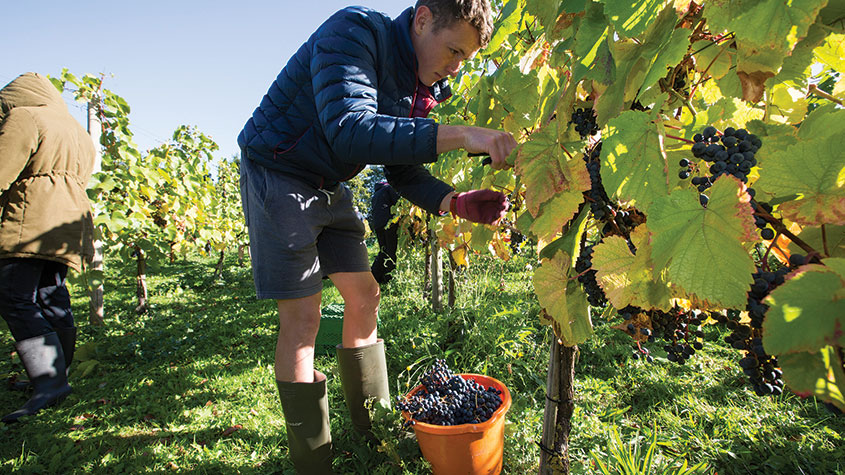The fast-growing success of Britain’s wine industry
Hotter summers are great for the nation’s winemakers, says Chris Carter. But land for vineyards is selling at a premium – expect to pay up to £25,000 an acre for the best spots.


Get the latest financial news, insights and expert analysis from our award-winning MoneyWeek team, to help you understand what really matters when it comes to your finances.
You are now subscribed
Your newsletter sign-up was successful
Want to add more newsletters?

Twice daily
MoneyWeek
Get the latest financial news, insights and expert analysis from our award-winning MoneyWeek team, to help you understand what really matters when it comes to your finances.

Four times a week
Look After My Bills
Sign up to our free money-saving newsletter, filled with the latest news and expert advice to help you find the best tips and deals for managing your bills. Start saving today!
Britain is getting warmer. This year’s record-breaking 40.3°C, recorded at Coningsby, Lincolnshire, followed years of hotter summers – the ten warmest years in Britain have occurred since 2002.
That is, however, good news for Britain’s wine growers. English sparkling wine already competes with the best Champagne has to offer and regularly wins international awards. When it comes to reds, however, the climate is still too cold and clammy. Not for much longer, says a recent paper in the viticulture science journal OENO One.
By 2040, more sunshine and less rainfall will make pinot noir, the mainstay of Burgundy reds, viable in the south of England, while areas further north will be opened up to the production of other wines, according to the authors from the Climate Resilience in the UK Wine Sector project. That may seem like a long way away, but the time it takes for vines to mature means wine growers need to decide now which wines to make in 2040.
MoneyWeek
Subscribe to MoneyWeek today and get your first six magazine issues absolutely FREE

Sign up to Money Morning
Don't miss the latest investment and personal finances news, market analysis, plus money-saving tips with our free twice-daily newsletter
Don't miss the latest investment and personal finances news, market analysis, plus money-saving tips with our free twice-daily newsletter
Land for vineyards is at a premium
The area under vine in Britain has expanded by 70% in the last five years, according to the trade body WineGB. Even prestigious French producers have made the hop across the Channel. “This boom in UK wine has translated to strong demand for land suitable for planting vines and there is no sign of this letting up,” says Nick Watson of Strutt & Parker. The property consultancy’s viticulture wing has seen even hobbyists come knocking at its doors, along with those looking to start new winemaking ventures on 20 to 30 acres or more.
That puts land suitable for growing vines at a premium, due to the requirements of climate and terroir. Free-draining, sunny, south-facing slopes below 100 metres above sea level, that are sheltered from winds and late frosts, “must be proactively sought out and purchased privately”, says Watson. And while most arable land sells for up to £10,000 an acre, budding wine growers can expect to pay up to £25,000 an acre for the best spots in Sussex and Kent. An acre already planted with vines commands up to £35,000.
One such vineyard is for sale with Cheffins, with a £2m guide price. Chilford Hall, outside Cambridge, is one of England’s oldest established commercial vineyards. Its 22-acre vineyard (18 are under vine) comes with a winery, wine-making equipment and around 45,000 bottles of wine produced on the estate.
The late Sam Alper, designer of the Sprite caravan and founder of the Little Chef restaurant chain, established the vineyard in 1972. Since then, Chilford Hall’s wines have scooped up WineGB awards, and the estate today produces up to 18,000 bottles of red, white, rosé and sparkling wines. The seller, Alper’s widow, Fiona, feels it’s time to move on and is looking for “someone with passion and energy” to take over. Judging by the trends in British winemaking, she should have no trouble finding a buyer.
Get the latest financial news, insights and expert analysis from our award-winning MoneyWeek team, to help you understand what really matters when it comes to your finances.

-
 Early signs of the AI apocalypse?
Early signs of the AI apocalypse?Uncertainty is rife as investors question what the impact of AI will be.
-
 Reach for the stars to boost Britain's space industry
Reach for the stars to boost Britain's space industryopinion We can’t afford to neglect Britain's space industry. Unfortunately, the government is taking completely the wrong approach, says Matthew Lynn
-
 Where to look for Christmas gifts for collectors
Where to look for Christmas gifts for collectors“Buy now” marketplaces are rich hunting grounds when it comes to buying Christmas gifts for collectors, says Chris Carter
-
 How dinosaur fossils became collectables for the mega-rich
How dinosaur fossils became collectables for the mega-richDinosaur fossils are prized like blue-chip artworks and are even accelerating past the prices of many Old Masters paintings, says Chris Carter
-
 Sotheby’s fishes for art collectors – will it succeed?
Sotheby’s fishes for art collectors – will it succeed?Sotheby’s is seeking to restore confidence in the market after landing Leonard Lauder's art collection, including Gustav Klimt's Portrait of Elisabeth Lederer
-
 Collectables: The Christmas gift for people who have everything
Collectables: The Christmas gift for people who have everythingA collectable is deeply personal. It is the archetypal thoughtful Christmas gift.
-
 The high-end art market is still on fire
The high-end art market is still on fireReviews The art-market billionaires are coming out of lockdown. Chris Carter reports
-
 Digital art: a new chapter in art history or just a fad?
Digital art: a new chapter in art history or just a fad?Reviews How will history judge Beeple and the new digital way of making art?
-
 Having the time of your life
Having the time of your lifeSPONSORED CONTENT – The auction scene has never been more dynamic. And now seasoned collectors and beginners alike can view and bid on a wide range of items including vintage timepieces online at thesaleroom.com.